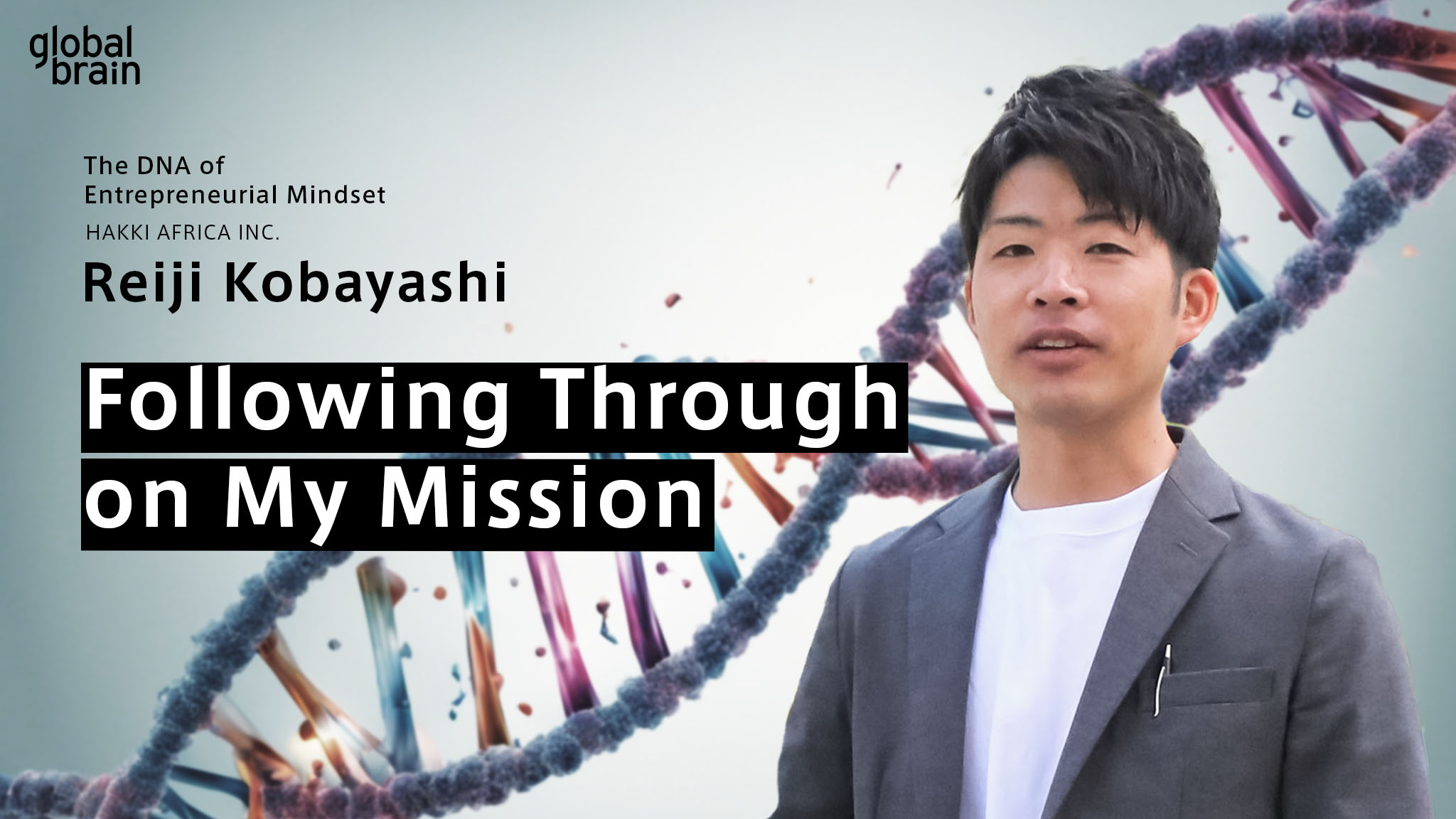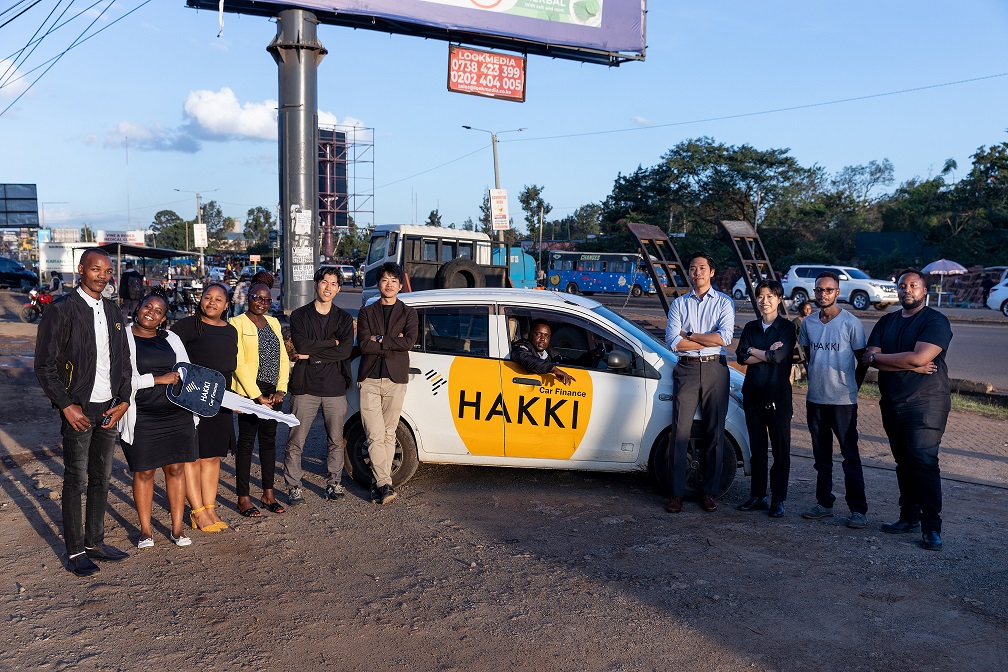The DNA of Entrepreneurial Mindset: Following Through on My Mission / Reiji Kobayashi, HAKKI AFRICA INC.
HAKKI AFRICA INC. runs a microfinance business for taxi drivers in Africa. We sat down with the CEO, Reiji Kobayashi, to ask about his personal side and aspirations.

Written by the Universe Editorial Team
In “the DNA of Entrepreneurial Mindset,” we pick startup entrepreneurs who are in the limelight to find out their current values and mindset from various angles.
This time, we welcomed Reiji Kobayashi, CEO of HAKKI AFRICA INC. (HAKKI AFRICA).
Reiji Kobayashi
A serial entrepreneur who started an e-commerce business in 2012 as a student and successfully sold it afterward. In his next endeavor, he grew a real estate startup to become the top company in Japan’s Shonan area within three years and sold it to a major industry player. He went to Africa alone with the proceeds, starting a finance business with his own money in 2019. He won a pitch contest held by the Managing Director of Grameen Bank and others and also received a pitch award held by the Japan’s Financial Services Agency and NIKKEI. He is the winner of Fintech Japan 2021, Japan SDGs Award Deputy-chiefs’ Award (by Foreign Minister), Tokyo Governor’s special award, and the Excellence Award of the UNDP Youth Co:Lab U-35.
──What made you start a company?
When I was living in a shared house, I once said without thinking, “This house would be a far better place if it was in a better location and the quality of the property was enhanced.” I felt ashamed of myself for saying such a thing as if it were someone else’s matter when I could have considered it as my own problem. I should have been more proactive in making improvements instead of criticizing the situation at hand. This experience changed my mindset and I started thinking about how I can become someone who can change society, which led to my ambition of becoming an entrepreneur.
Since I moved to Kenya, I have always been mindful of what a Japanese person like me can do for the local communities. The solution I came up with was to leverage my entrepreneurial experience and focus on the financial sector, where I can leverage Japan’s lower interest rates compared to other countries and the global top-level unused asset balance.
Then, I narrowed down what kind of business would be good potential recipients of loans using Japanese money and thoroughly analyzed the data. This led to the establishment of the current business that delivers low-risk financing to gig workers who had no access to loans before.
──What are your non-negotiables?
Taking action faster than anyone else.
Small improvements eventually become a big change. Since our business spans Kenya, South Africa, and India, a slight delay in action may cause problems for other people. Even if our action is somewhat less-than-perfect, we value the speed to make up for it.
──Can you briefly explain your team?
We have “momentum.”
Many of our members are highly goal-oriented, and each of us is pursuing his/her own work that is different from others’. That is why we carefully analyze each other’s shortcomings and complement each other to move forward as a team.
We aim to steadily move forward by involving others with speed and creativity, which overpowers each member’s shortcomings.

──How do you recharge yourself when you feel tired mentally and physically?
I sleep or play futsal on the weekends. People in India, where I currently live, enjoy various kinds of sports, so I have the chance to exercise several times a month.
──What drives you forward?
The “sense of achievement that we are contributing to solving issues faced by the locals.” Directly seeing our customers’ reaction to our business often makes me feel that my job is worthwhile.
Our business contributes to solving not only the issues faced by the gig workers in Kenya but also challenges related to the effective use of Japan’s unused assets. Our stakeholders also take pride in contributing to society and working energetically, inspiring us to soundly carry out the business.
──What does it take to become a CEO?
I believe there is no general answer to this question.
However, considering our current business phase, we understand that a CEO is someone who
- keeps guiding the team no matter the challenges
- makes quick decisions and is determined to make sure those decisions continue to be successful.
This is what I keep in mind as the CEO.
──Do you have any books that helped you shape your values?
Jitsugyo no Nihon Sha Bunko “Kokorozashi Takaku: Son Masayoshi Seiden)” (English title: Aiming High: Masayoshi Son, SoftBank Group and Disrupting Silicon Valley)
While today’s social context is different from the time Masayoshi Son founded the company, this is one of the books that made me feel extremely jealous as it vividly depicts how one single person’s enthusiasm can change the world.
Generally, people would not imagine that they can “drive the global economy.” Such a thing would never be achieved by someone who thinks it is impossible. It made me realize that it is only myself who defines my own limits.
In his biography, Son refers to another book titled “Ryoma ga Yuku,” which I consider as a prequel, so I would say both these two books influenced me
Like the main characters in these books, I too intend to fulfill my mission to the very limits of what one person can achieve.
──Lastly, please share your aspirations.
Different from driving the gigantic Japanese economy, our business is located in Africa where a single startup can impact national politics and really experience transforming the world. This comes with a huge responsibility.
We will keep building structures and offering incentives in our services that bring benefits to those who are making sincere efforts in emerging countries, where people can still reap benefits from cheating and deceiving others.
HAKKI AFRICA INC.

In Africa, taxi drivers often lack the documentation or initial deposits for bank loans and are left to rent vehicles from private owners.
HAKKI AFRICA addresses this issue by offering financial products in Kenya to support vehicle purchases. The company has developed a proprietary credit-scoring algorithm to automate credit assessments and minimize risk.